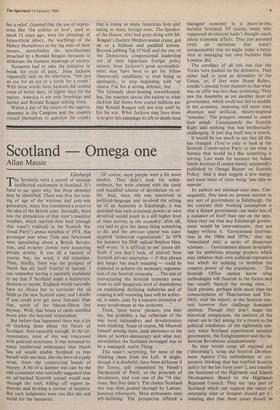Scotland Omega one
Allan Massie
Edinburgh he Seventies were a period of unusual 1 intellectual excitement in Scotland. It's hard to say quite why, but three elements may be identified. There was first the com- ing of age of the wartime and post-war generation, many less committed a priori to the idea of the British state. Secondly, there was the stimulation of that state's manifest troubles, which reached their limit (though that wasn't realised) in the Scottish Na- tional Party's annus mirabilis of 1974, that grotesque year when Time and Newsweek were speculating about a British Revolu- tion, and ex-army clowns were mustering private armies. It was all a fantasy of course, but, my word, it did stimulate. Then, thirdly, there was the prospect of North Sea oil, itself fruitful of fantasy. I can remember having it patiently explained to me that if Scotland made a democratic decision to secede, England would naturally have no choice but to surrender the oil fields to the new Scottish state; and I doubt if you could ever get more fantastic than that, north of the Mason-Dixon line anyway. Well, that house of cards tumbled down after the botched referendum.
But before that happened there was a lot of thinking done about the future of Scotland. And naturally enough, in the cir- cumstances, most of this was concerned with political structures. It was assumed by many intellectual enthusiasts that North Sea oil would enable Scotland to free herself with one leap, like the hero of a pulp serial, from the constricting bonds of history. A bit of a damper was cast by the odd economist who unkindly suggested that an oil-backed Scottish pound would soar through the roof, killing off export in- dustries and inviting a torrent of imports. But such judgments were too like the real world for the fantasists. Of course, most people were a bit more modest. They didn't look for indep- endence, but were content with the timid and muddled scheme of devolution on of- fer. And, since this was conceived in political- language and involved the setting up of an Assembly in Edinburgh, it was assumed that such economic powers as were devolved would result in a still higher level of state activity in the economy; after all, you had to give the damn thing something to do, and the obvious course was state- inspired 'industrial regeneration.' In 1978 for instance the SNP radical Stephen Max- well wrote: 'it is difficult to see' (more dif- ficult if you don't look, of course) 'how Scottish private enterprise — if that phrase any longer has much meaning — could be expected to achieve the necessary regenera- tion of the Scottish economy... The aim of restructuring the Scottish economy away from its still dangerous level of dependence on traditional declining industries and of creating a self-renewing base will be achiev- ed, it seems, only by a massive extension of state involvement in the economy...'
Tired, 'poor horse' phrases, you may say, but probably a fair reflection of the way most nationalists and devolutionists were thinking. Some of course, Mr Maxwell himself among them, paid obeisance to the ideas of worker-democracy and what not; nevertheless the Scotland envisaged was to be a managed, statist Thing.
This wasn't surprising, for most of the thinking came from the Left. It might, though it is doubtful, have been different if the Tories, still committed by Heath's Declaration of Perth, to the principle of devolution, had won one of the '74 elec- tions. But they didn't. The clumsy Scotland Act was then pushed through by Labour, however reluctantly. Most enthusiasts were left-inclining. The prospectus offered a managed economy in a more-or-less socialist Scotland. Of course, many who supported devolution hadn't thought much about economic affairs. They just assumed (with an optimism that wasn't unreasonable) that we might make a better shot at managing our own business than London did.
The corollary of all this was that the Tories were pushed on the defensive. They either had to pose as defenders of the Union, or, if they were Home Rulers, couldn't conceal from themselves that what was on offer was less than promising. They saw the Assembly as yet another layer of government, which could not fail to meddle in the economy, imposing still more state direction and artificial, theory-inspired `stimulus'. The prospect seemed to numb their minds. Consequently the Scottish Right said nothing that was intellectually challenging. It just dug itself into a trench.
It would be too much to say that all this has changed. (You've only to look at the Scottish Conservative Party to see what a fantasy that would be.) But something is stirring. Last week for instance the Adam
Smith Institute (London-based, admittedly) published its Omega Report on Scottish Policy. And it does suggest a new energy and some sense of there being 'une idee en marche'.
Its authors are minimal-state men. Con- sequently, they have no present interest in any sort of government in Edinburgh. On the contrary their working assumption is that a distant government can make less of a nuisance of itself than one on the spot.
Since they see that any Edinburgh govern- ment would be interventionist, they are happy without it. 'Government interven- tion in the 1960s and 1970s,' they say `stimulated only a series of disastrous schemes... Governments almost invariably opt for ambitious prestige projects which may enhance their own political reputation but which do nothing to mobilise the creative power of the population ... The Scottish Office cannot know what technologies will flourish in the future and has usually backed the wrong ones. .. ' Such phrases, perhaps little more than the commonplaces of Thatcherism and Teb- bitry, stud the report; in the Scottish con- text however they challenge dominant opinion. Though they don't make the historical comparison, the authors of the report are in fact asking for a return to the political conditions of the eighteenth cen- tury when Scotland experienced minimal government, the Enlightenment and the In- dustrial Revolution simultaneously.
So they would scrap all regional aid (`distorting'), scrap the Scottish Develop- ment Agency (`the embodiment of cor- poratist thinking that has typified Scottish policy for the last forty years'), and transfer the functions of the Highlands and Islands Development Board to the Highlands Regional Council. They say 'any part of Scotland which can support the status of enterprise zone or freeport should get it', insisting also that these zones should be what they are not in fact now, that is, free. They would change the taxation system in the North Sea, expose North Sea gas to market forces, privatise the two electricity boards, and, most interestingly of all, reform Scottish banking by freeing Scottish banks from the control of central monetary policy; 'they should be able to issue as much of their own currency as they judged to be right for the conditions of the Scottish economy.'
This last suggestion — and their pro- posals for local government and educa- tional reform — are so novel and far- reaching that I hope to discuss them in subsequent articles. Meanwhile the first im- portance of this report is the evidence that the Scottish Right is stirring, that is has got itself out of its dull statist and unionist trench, and is thinking again. 'In the 1970s,' it states 'it was thought that the way to open up and democratise Scottish government was through a directly elected assembly. Our alternative is to set about the systematic removal of powers, especially economic powers, from central govern- ment .. '
It is an alternative that will meet resistance from the vested interests of bureaucracies and quangoes, which were not threatened at all by the schemes of political devolution, but battle has been joined; and it is one worth joining.







































 Previous page
Previous page